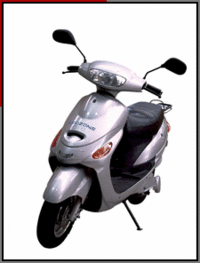Leo Motors Outlines the Progress of the T1 Electric Motorcycle Project
LAS VEGAS--Leo Motors, Inc (Pinksheets:LEOM) based in Seoul, Korea. The company’s line-up of projects includes scooters, motorcycles, electric sports utility vehicles, electric fast attack vehicle and an electric supercar. Also, the company has developed a EV solutions such as rapid charger system, BMS-Battery Management System for polymer battery power pack and electric power train system.
After reengineering for safety features, the T1 prototype will be complete by mid-May 2008 and then production will move to Leo Motorcars Thailand Inc., a joint venture by Leo Motors Inc and GEM Asia Inc.
The T1 is a 3-wheel motorcycle which has 2-wheels in the front and 1-wheel on rear. It uses Leo Motor’s polymer battery with rapid charger and a powerful electric drive system.
Leo Motorcars Thailand Inc. anticipates sales to the Thai police force.
Leo Motors, Inc. specializes in electrical technologies, engineered to inspire and influence a clean, green, zero-emission approach to transportation. With patented technology and a team of experts in electric vehicle design, automotive engineering, and vehicle styling, they have themselves developed a line of seven different EVs in the last two years.
Global Electric Motors Car Asia Co., Ltd. is the largest electric car dealer in Thailand and an associate company of the Siam Steel Service Center Public Company Limited.
Statements in this press release that are not statements of historical or current fact constitute "forward-looking statements" as defined within the meaning of the Private Securities Litigation Reform Act of 1995. These forward-looking statements involve known and unknown risks, uncertainties and other unknown factors that could cause the actual results of the company to be materially different from the historical results or from any future results expressed or implied by such forward-looking statements. In addition to statements which explicitly describe such risks and uncertainties, readers are urged to consider statements labeled with the terms "believes," "belief," “estimates,” "expects," "intends," "anticipates," "will," or "plans" to be forward-looking and not implying certainty.



